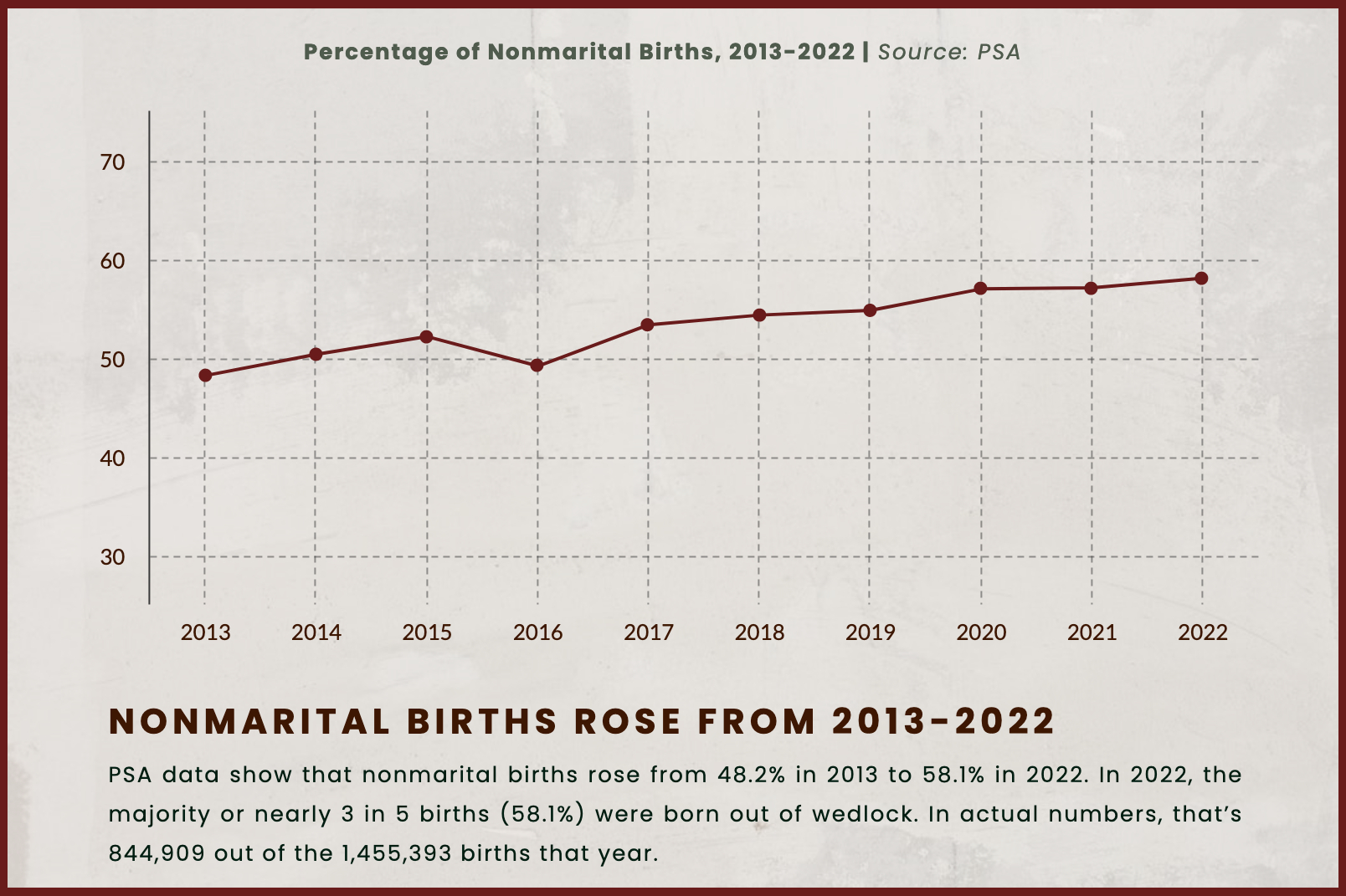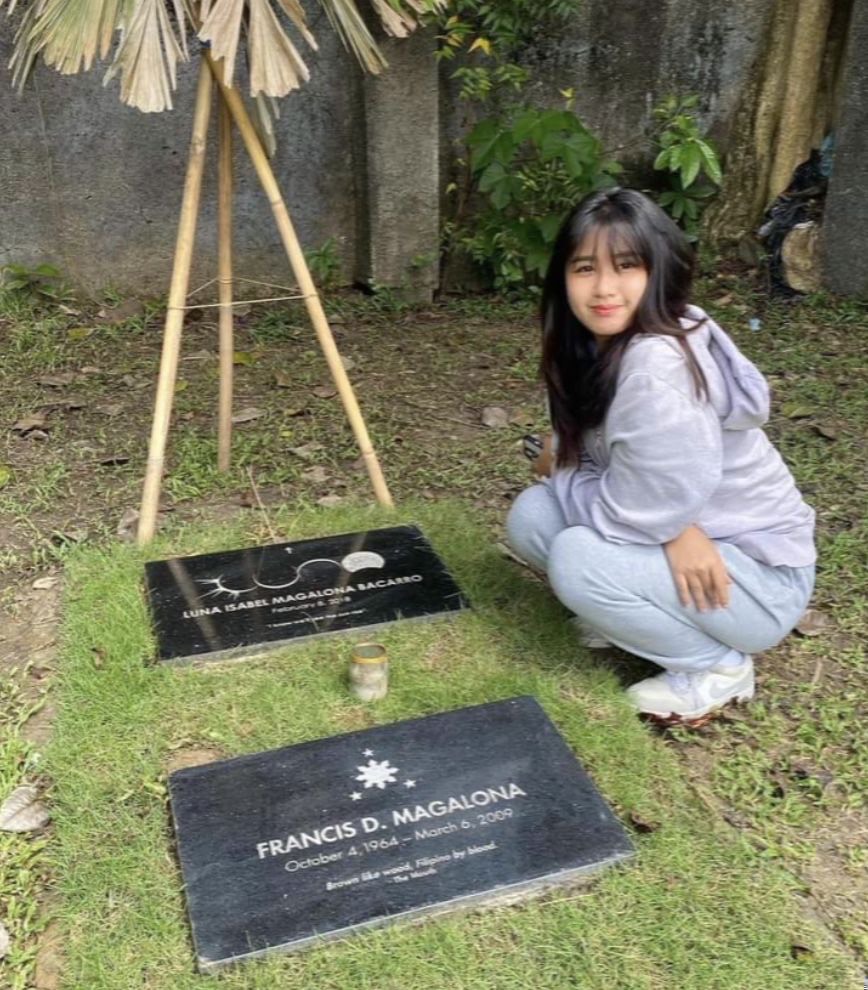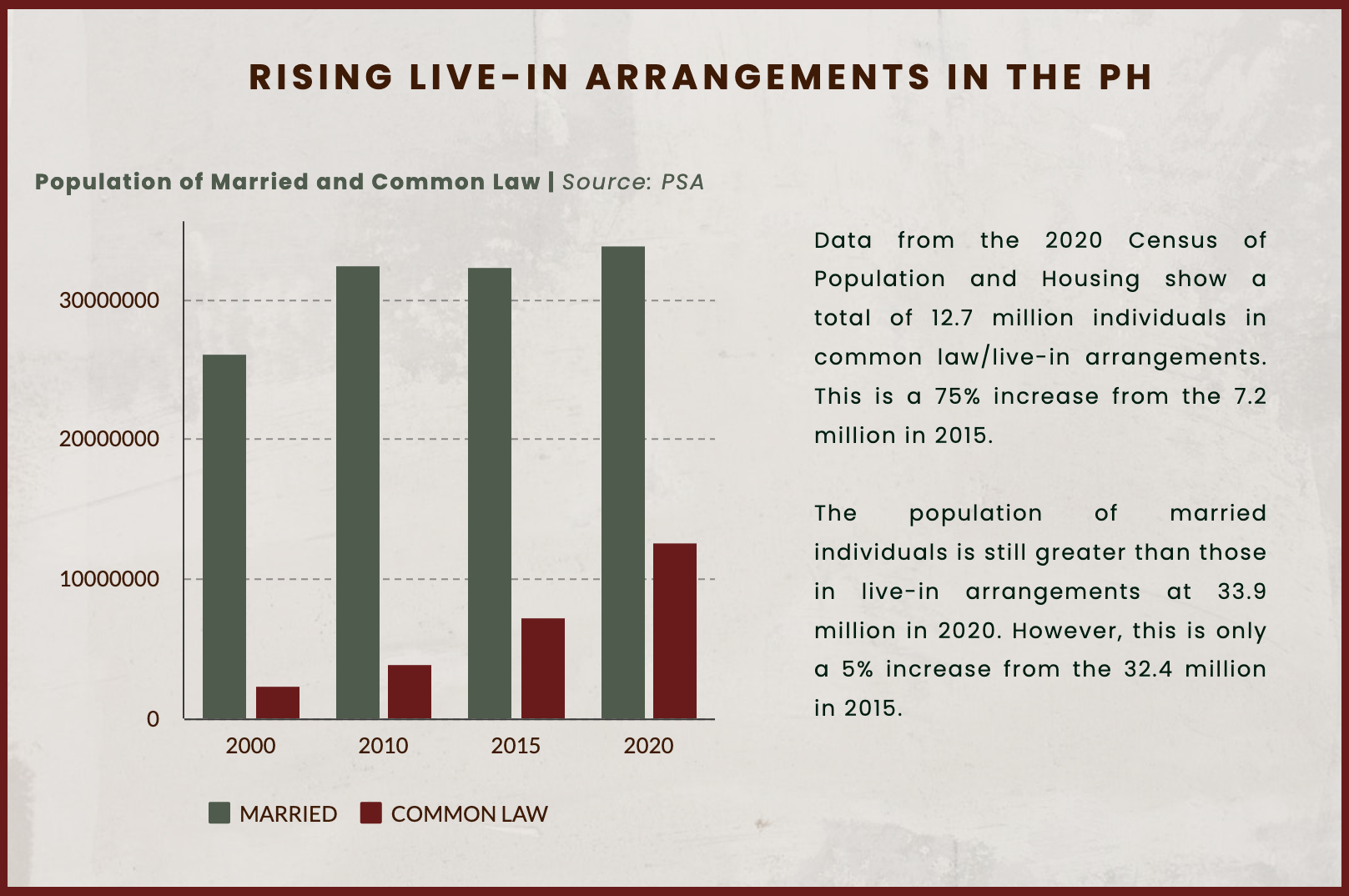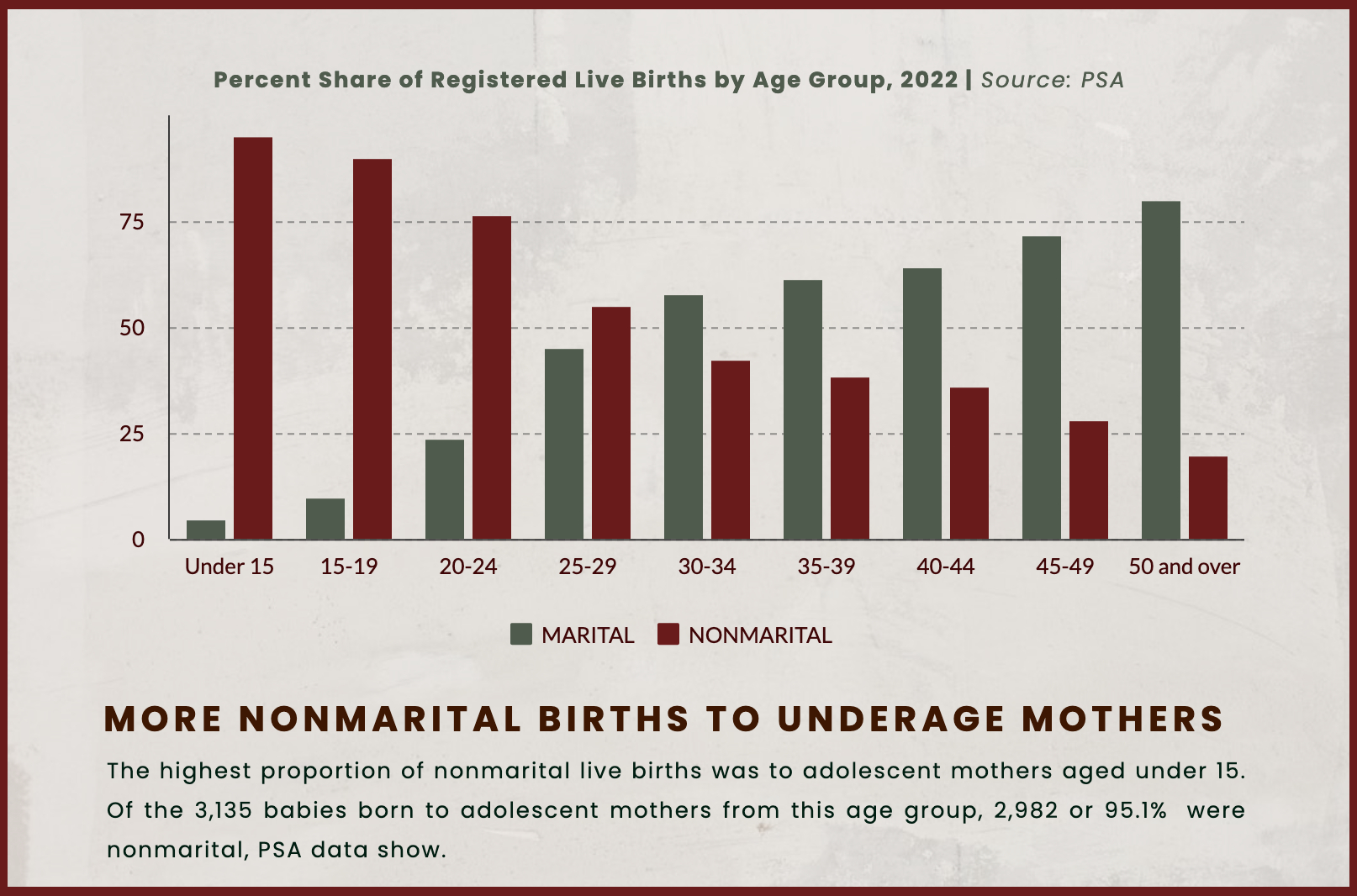We use cookies to ensure you get the best browsing experience. By continued use, you agree to our privacy policy and accept our use of such cookies. For further information, click FIND OUT MORE.
Illegitimacy used to be taboo. Now, it’s becoming the new normal.
Data from the Philippine Statistics Authority (PSA) show that the percentage of births within marriage dropped from 51.8% in 2013 to 41.9% in 2022.
Births outside of marriage, meanwhile, rose from 48.2% in 2013 to 58.1% in 2022.
There were 1,455,393 births that year–610,484 to married parents, and 844,909 to unmarried parents.

Out-of-wedlock children are now the majority of births.
“Sex daw muna ang gusto ng mga kabataan followed by parenthood and then by marriage a little later,” Professor Maria Paz Marquez of the University of the Philippines Population Institute (UPPI) said.
“This veers away from the traditional child birth occurring within marriage. Dati marriage, sex, then child birth. Ngayon hindi–sex, child birth, then marriage,” she added.
That last step is not even considered necessary by many. The study revealed that the percentage of youth who believe a woman should keep the baby without getting married was 64% in 2021, compared to 58% in 1994; and the percentage of youth who said a woman should try to get the father of the child to marry her was 31% in 2021, compared to 36% in 1994.
Cheska and Alix are among the many children born outside of marriage. Both grew up without their fathers, went through emotional battles, and toughened by the love of the solo parent by their side.
Cheska always knew she was a love child. Her family and friends were also aware, and she led what she described as a fairly normal life.
“I processed it very well,” she told GMA News Online.
Her father died when she was only six months old, so she never really knew him except through his music and her mother’s narratives.
“I’m proud to be one of his daughters,” she said.
Cheska also knew the situation between her parents. “First thing I would like to clear up, they met a very long time ago. It wasn’t like just a one-night stand or anything. They’d been together for three years, and I wasn’t like one of those love child na parang one-night stand. He knew. He very much well knew about the pregnancy, and he was actually happy about it,” she said.
“[He was] a very nice guy and very much a very nice father.”

Cheska visits the grave of the late rapper Francis Magalona.
In October 2023, her mother revealed that Cheska was the daughter out of wedlock of the late rapper Francis Magalona. His family has yet to directly comment on the claim made by Cheska's mother.
FrancisM is beloved by the public as is his family, and the revelation that he had another child by another woman was not received well by many. After living 15 years under the radar, Cheska and her mom, Abegail Rait, were dragged through the gauntlet of public criticism and scrutiny.
“When I was a baby, she had tried to keep me, like, away from the media as much as possible because there were like a few articles going around before,” Cheska said.
When Cheska's mother revealed in a vlog her past relationship with the showbiz icon and their daughter, Cheska found it liberating. She said it took her out of the remaining shadows and into the light, even if it was the harsh glare of other people’s judgment.
“I felt more free…I felt free that I felt seen, finally seen… [but] it felt very unfair because we were judged right away by the people. Like, they don’t know our story,” she said.
Cheska had no choice but to grow up without her dad. For Alix (not his real name), not having his father around was a decision by the adults in his life. For better or worse, it was a cause of anger and loneliness. He remembers the pain from a very young age, when he couldn’t bring a dad to family days in kindergarten, and never even saw a hint of his father except for one incident in high school.
“My father tried to reach out to me [and] talked to me. Tinanong niya lang ako kung kamusta ka na, ano na ginagawa mo. After that question, nakita kasi ako ng mom ko na kinakausap ko siya tapos pinaghiwalay na kami,” he said.
(My father tried to reach out to me and talked to me. He asked me how I was, what I was doing. Then my mom saw me talking to him and separated us.)
Growing up, he often found himself observing and comparing himself with friends in married families. He was also swayed by the conclusion that others made about him—that his expression of “feminine” characteristics was because he did not have a father in his life. “Ang aga ko na-confuse na hindi pa ako ready for that confusion, pero other people’s observations... linked that observation to my lack of having a father,” Alix said.
(I got confused too early when I wasn’t even ready for that confusion, but because of other people’s observations and linked that observation to my lack of having a father.)
“Naguluhan yung utak ko, naapektuhan ako. So hindi siya ’yung natural progression na, ‘Oh I realized I’m not straight because I fell in love with someone.’ Hindi siya ganoon. It’s more of, ‘I’m not straight kasi babae ako kumilos,’ alam mo yun?” Alix added.
(I got confused, I was affected by what they were saying. So, it wasn’t the natural progression that ‘Oh, I realized I’m not straight because I fell in love with someone.’ It wasn’t like that. It’s more of, ‘I’m not straight because I was feminine.’ I had traits that were female.)

Alix grew up comparing himself with friends in married families.
It was during college that Alix was able to deal with a lot of the conflict that came with being a “love child” and not having his father around.
“Know your self-worth. It doesn’t mean that [just because] you’re a love child, hindi ka na [you’re not] worthy of family. You’re actually as worthy as those na pinanganak na may parehong magulang [who were born to married parents],” he said. “Your self-worth is defined by yourself, so I hope that people like me will use self-love and actually use your situation more as an inspiration to tell others and prove to yourself that you can, that you’re not different than other people,” he said.
Of course, being born to married parents is no guarantee that you’ll grow up with both of them in your life, but Alix views it as a “bare minimum” when creating his own family.
“It doesn’t hurt to have that extra layer of protection in the relationship. So, I still believe in it. Is it necessary, is it like a requirement for me if my partner in the future will say na ayaw niya magpakasal [he doesn’t want to get married]? I think it will still become an issue with me, because it’s not just about marriage,” he said.
“Not because of the contract or not because of the legal binding whatever it supports, but mainly for me it's the anchor to a relationship. I still believe in the essence of marriage because I feel like this is where partners not just exchange vows, but these are where partners testify to each other and to whatever form of faith they have that they will try their best to keep their partners by allowing them,” he continued.
He added that he also wanted the security of the legal tenets that come with marriage, and that a child could benefit from growing up in a marital family.

A “love child”–a child born out of wedlock, whether to unmarried parents or to at least one parent with a different legal family–is referred to as illegitimate in law.
Marquez relates the rise in nonmarital births to the increase in nonmarital relationships, including unmarried couples living together.
“We will have a better understanding from our censuses, which show the rising pervasiveness of cohabitation or live-in arrangement, suggesting the delinking of childbearing with marital union,” Marquez said.
The 2000 Census of Population in Housing shows that in that year, there were 33.9 million individuals who were in marriages, compared to only 12.7 million individuals in common-law or live-in relationships. However, there was only a 5% increase in marriages from 2015 to 2020, compared to a 75% surge in nonmarital cohabitation.
Marquez said the rising number of births out of wedlock also resonates with the results of the UPPI’s Young Adult Fertility and Sexuality Study in 2021, showing a shift in young people’s order of priorities. The mean for what the respondents saw as ideal ages for marriage, first sexual experience, and first child showed that they do not necessarily believe it should happen in that order.
While growing acceptance–and changing opinions on what may be considered “moral” in society–has something to do with the rise in having children out of wedlock, another angle cannot be overlooked: The fact that many nonmarital children are born to underage girls too young to be married in the first place.
In 2022, there were 3,135 babies born to mothers under the age of 15, with 2,982 being born out of wedlock. Setting aside the distressing fact that there are children under the age of 15 who are married, that means 95.1% of children born to these mothers are born out of wedlock.
Among mothers aged 15 to 19, there were 147,003 births, with 90% or 132,346 born out of wedlock.
Ringing the alarm on the 35% surge of pregnancies among under-15 children–from 2,320 in 2021 to the aforementioned 3,135 in 2022–the Commission on Population and Development (CPD, formerly POPCOM) called for the passage of the Adolescent Pregnancy Prevention Act, which provides for a national policy to prevent adolescent pregnancies and institutionalize social protection for adolescent parents.

In the law, nonmarital children do not enjoy the same rights as children born in wedlock.
Enacted in 1949, the Civil Code of the Philippines dictates that nonmarital children can only claim a fraction of what a marital child would get from their parents.
“The general concept in an inheritance is, the illegitimate child will only get half of what a legitimate child gets,” VAL Law attorney Paolo Abarquez explained in a 2023 interview with GMA News Online.
He said that due to the age of the Code, “there are certain concepts there that are not very modern, still very traditional.”
“[A] lot of the provisions there are adopted from the old Spanish code pa,” he added.
However, Abarquez added, the Philippines is also a signatory to the UN’s Convention on the Rights of the Child.
"Under the convention, wala na dapat distinction between legitimate and illegitimate," Abarquez said, because “kawawa yung child. Hindi naman niya kasalanan ipanganak." He added that the trend in other countries is to remove the labels "legitimate” and “illegitimate" to remove the stigma as well.
"But the Philippines, we are still traditional. Our civil code still has that label," he said.
Still, the wheel of progress turns, even in a country with some outdated laws. The term “illegitimate” may be falling out of favor, as evidenced by a 2022 Supreme Court decision where Associate Justice Marvic Leonen chose instead to refer to those born out of wedlock as “nonmarital” as opposed to “marital” children, with the court describing the term “illegitimate” as pejorative.
UPPI’s Marquez said there should be more policies in place to protect the rights of nonmarital children. “Without judgment, we think the most important question is how policies adapt with these changes to ensure the welfare of the child, whether born out of wedlock or within the confines of the marital union,” she said.


Cheska said she often got recognized in public now. “So far, wala naman po akong nakaka-bad interactions with people in public [I haven’t had any bad interactions so far],” she said. “There were stares.”
Being a love child is just something that happens to be part of her identity but not something that defines her.
“It doesn’t make you less of a person. Like I’m just human. It is what it is. It happened,” she said.
Alix has a firm conviction now of what family is, and what it should be.
“I still believe parental love is unconditional and siguro mas naging firm yung belief ko na [my belief has gotten stronger that] parenthood is a responsibility,” he said.
“'Yung mga parents natin [Our parents] are there to support, are there to influence, but it doesn’t mean that we are mirrors of our parents… I want [my children] to surround themselves with good people because I grew up surrounded by good people. I think family is your emotional circumstance wherein you feel safe, wherein you feel loved, and wherein you feel connected. So, I think if those three important things are present, I think you can think of it as a family,” Alix added. —with data from Brenda Vallarta of GMA Integrated News Research/BM/LDF/NB, GMA Integrated News
